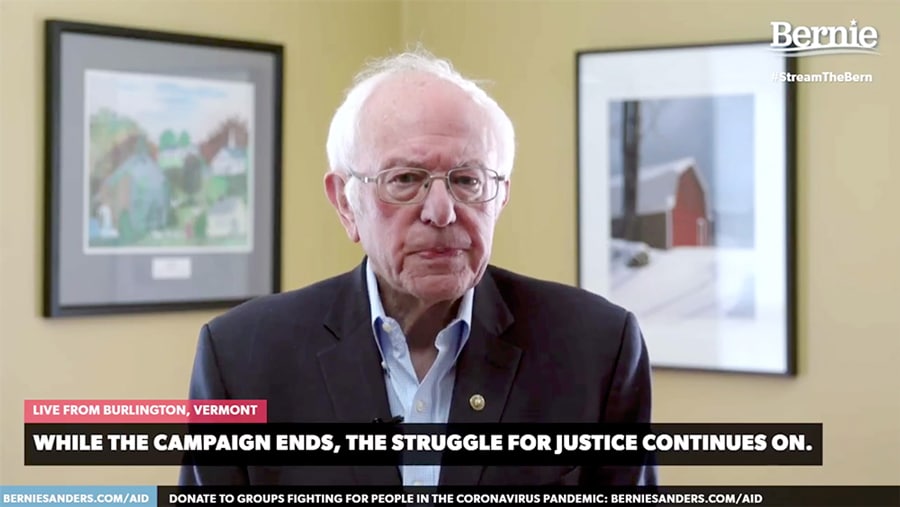Bernie Sanders drops out of the 2020 presidential race. What to expect next?
To the dismay of millions of Americans, Senator Bernie Sanders of Vermont announced Wednesday that he will be suspending his bid for the presidency, making former Vice President Joe Biden the presumptive Democratic nominee for the November 2020 elections. Why did Sanders suspend his campaign and what does it mean exactly for Biden’s election chances?
Although Sanders initially emerged as the front-runner, securing victories in Iowa, New Hampshire and Nevada, the scales quickly tipped in Biden’s favour as he defeated Sanders in several key states, including South Carolina, Michigan and Florida. In a live-streamed address to his supporters, Sanders announced that the lead secured by Biden makes the gap between the two insurmountable, and that in the midst of a pandemic that requires his attention as a Senator, he “cannot in good conscience” remain in the presidential race with no path to victory.

Suspending the campaign was clearly a tough decision for Sanders to make—one that was contested by some of his top advisers. Sanders agreed, however, to stay on the ballots in the states that have yet to vote in the primaries. “While Vice President Biden will be the nominee, we must continue working to assemble as many delegates as possible at the Democratic convention, where we will be able to exert significant influence over the party platform and other functions,” Sanders said in his address.
There are numerous factors that contributed to the decline of Sanders’ initial soar. For one thing, the voter-base he appeals to most strongly, people under the age of 45, reportedly vote in fewer numbers. Furthermore, Biden enjoyed a surprise coalescence of other moderate Democratic presidential candidates, when several of them dropped out of the race and endorsed him right before Super Tuesday.
But most notably, Sanders’ campaign has been badly hit by the COVID-19 pandemic, which threw the country into disarray, instigated a health and economic collapse and hindered the Democratic presidential race. As was seen in the 2020 Democratic Party presidential primaries held since the outbreak of the virus in the US—confusion, misinformation, random closing of polling stations and refusals of state governments and Supreme Courts to ensure that people can vote remotely has resulted in a chaotic election process that effectively disenfranchised many voters across America (particularly voters of colour).
Unlike Biden, Sanders did not prod his supporters to go cast their ballots at in-person polling stations out of concern for their health. He also pressed to delay the upcoming primaries, stating that the virus both places people at risk and tampers with the election process, but his requests were rejected.
As the presumptive nominee, Biden will have to work hard to heal the deep divisions among Democrats and position himself as a viable rival to President Trump in November. So far, Biden has failed to generate enthusiasm around his candidacy or present policy proposals that make him stand out. His lacklustre performance and conduct make many worry that he will not be up to the task of taking on an aggressive bully like Trump. Biden’s ungainly response to the COVID-19 outbreak, and his steadfast refusal to advocate for universal healthcare also discourage many Americans from supporting him.
Biden’s most critical challenge now will be to win the trust of America’s younger generations, who are disproportionately supportive of Sanders and who overwhelmingly view the former Vice President as a puppet of the corporate and political establishments who will preserve the status quo.
Following Sanders’ announcement, a group of eight different organisations representing young people sent a joint letter to Biden in which they reminded the former Vice President of the strategic significance of their electoral base and called on him to incorporate progressive issues popular among America’s future generations into his agenda. Among the group’s requests from Biden were his commitment to push for universal healthcare, restructure the nation’s immigration mechanisms, adopt a $10 trillion Green New Deal, and appoint progressive-leaning politicians to his transition team.
As Sanders terminates his bid for the presidency, it is important to recognise the monumental impact of his campaign. Over the past five years, Sanders has been instrumental in shifting the public consciousness and Democratic establishment toward the left. He has brought formerly ‘fringe’ ideas—such as universal healthcare and workers’ rights—as well as unapologetic critiques of capitalism to the mainstream national discourse.
Sanders’ campaign slogan ‘Not me. Us.’ aptly encapsulates his campaign’s core function—building a movement; a nation-wide, diverse grassroots coalition of millions of individuals and countless groups that made tackling systemic injustices their primary goal. It is critical that this movement continue to grow, and that the takeaway from this current crisis will be a collective yearning for vast societal, political and economic changes. As Sanders said, “While the path may be slower now, we will change this nation, and with like-minded friends around the globe—change the entire world.”





